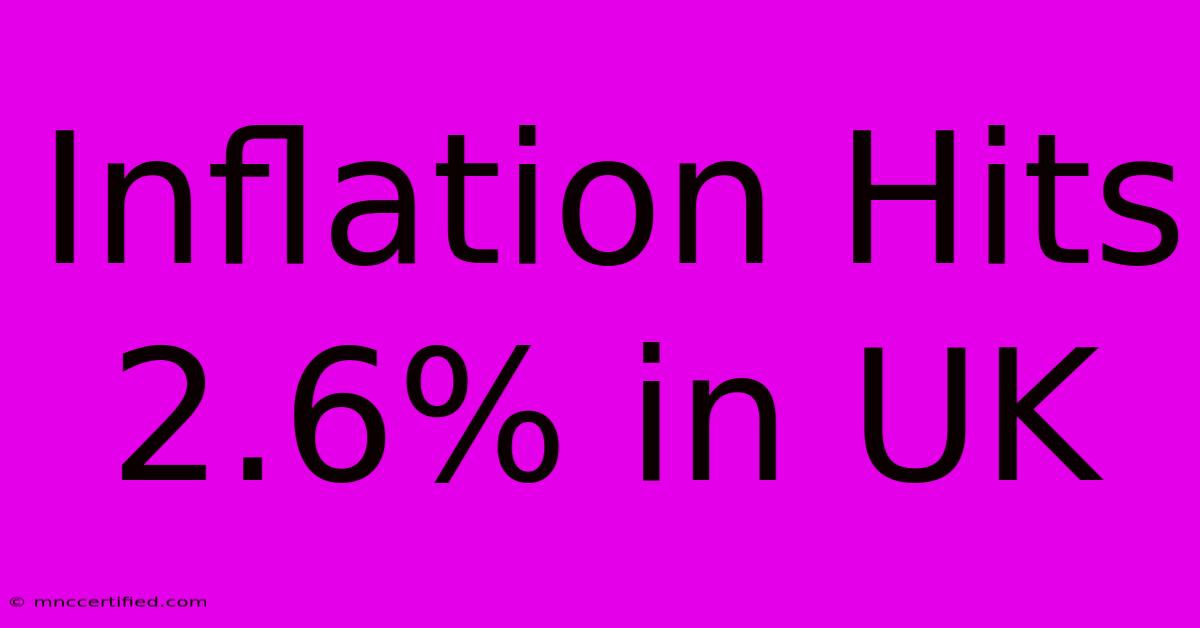Inflation Hits 2.6% In UK

Table of Contents
Inflation Hits 2.6% in UK: What it Means for Your Wallet
The UK's inflation rate has climbed to 2.6%, according to the latest figures released by the Office for National Statistics (ONS). This marks a significant increase from the previous month and surpasses the Bank of England's target of 2%. This rise in inflation is impacting household budgets across the nation, sparking concerns about the cost of living crisis and the potential for further economic instability. This article delves into the causes of this increase, its potential consequences, and what you can do to navigate these challenging economic times.
Understanding the 2.6% Inflation Figure
Inflation, simply put, is the rate at which the prices of goods and services are increasing. A 2.6% inflation rate means that, on average, the cost of living is 2.6% higher than it was a year ago. This seemingly small percentage can have a substantial impact on individuals and families, particularly those on lower incomes. The ONS bases its calculations on a "basket" of goods and services, tracking price changes over time. This basket includes everything from groceries and energy bills to transportation and entertainment. The recent increase is driven by a complex interplay of factors.
Key Drivers of the Inflation Surge
Several factors contributed to the recent jump in the UK's inflation rate:
1. Energy Prices: A major contributor is the soaring cost of energy. Global supply chain disruptions and increased demand have pushed up energy prices significantly, impacting both household bills and the cost of producing goods. This is a worldwide issue, and the UK is not immune to its effects.
2. Supply Chain Disruptions: Ongoing global supply chain bottlenecks continue to constrain the availability of goods, driving up prices. The pandemic exacerbated these issues, and recovery is proving slower than anticipated. This shortage of goods directly affects inflation across various sectors.
3. Increased Demand: As the economy recovers from the pandemic, demand for goods and services has increased, outpacing supply in many areas. This imbalance between supply and demand further fuels price increases.
4. Wage Growth: While wage growth is generally positive, it hasn't kept pace with the rising cost of living. This means that many people are experiencing a real-terms decline in their disposable income, despite receiving pay rises.
What Does This Mean for You?
The 2.6% inflation figure translates to higher prices for everyday essentials. This can mean:
- Higher grocery bills: Food prices have been rising steadily, putting a strain on household budgets.
- Increased energy costs: Electricity and gas bills are significantly impacting many households.
- Costlier transportation: Fuel prices remain high, affecting commuting and travel costs.
How to Navigate the Rising Cost of Living
While the current economic climate presents challenges, there are steps you can take to mitigate the impact of inflation:
- Budgeting: Create a detailed budget to track your income and expenses. Identify areas where you can cut back.
- Comparison Shopping: Compare prices across different retailers before making purchases to find the best deals.
- Switching Providers: Consider switching energy suppliers, mobile phone providers, and other services to secure better deals.
- Saving Strategies: Explore different savings options to protect yourself against further price increases.
The Outlook for Inflation
The Bank of England is closely monitoring the inflation rate and is expected to take further action if necessary. Predicting the future trajectory of inflation is complex, but several factors will play a crucial role. Further analysis of supply chain issues, energy market volatility, and global economic conditions is vital to understand the longer-term picture. Staying informed about economic developments is crucial for individuals and businesses alike.
Conclusion: Staying Informed and Proactive
The 2.6% inflation rate in the UK highlights the ongoing challenges faced by many households. Understanding the drivers of inflation and adopting proactive strategies to manage your finances are crucial during this period. Stay informed about economic news and be prepared to adapt your spending habits to navigate these challenging times. By being mindful of your spending and seeking out the best deals, you can mitigate the effects of inflation and maintain financial stability.

Thank you for visiting our website wich cover about Inflation Hits 2.6% In UK. We hope the information provided has been useful to you. Feel free to contact us if you have any questions or need further assistance. See you next time and dont miss to bookmark.
Featured Posts
-
Comparing Hma And Luke Ford Vpn Services
Dec 19, 2024
-
Live Perez Future Uncertain At Red Bull
Dec 19, 2024
-
Koepka On Liv Pga Ryder Cup Vibes
Dec 19, 2024
-
Live Stream Arsenal Vs Crystal Palace Carabao Cup
Dec 19, 2024
-
Uk Sees Inflation Increase For Second Month
Dec 19, 2024